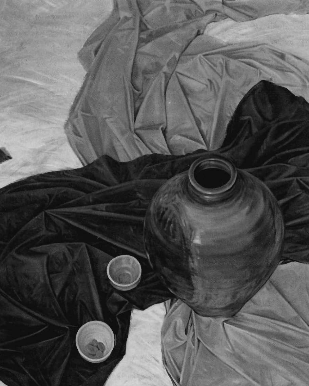Articles/Essays – Volume 20, No. 1
Pierced and Bleeding
Since my conversion to the Church almost fourteen years ago, I have struggled on various levels to come to terms with the atonement of Jesus Christ. At times, while young deacons passed gleaming trays among the believers I knew best, I watched as others unobtrusively swallowed torn pieces of bread, then raised tiny cups to their lips, and I wondered. What does this most frequent ordinance mean? As an adolescent, I often watched the hands of my father, himself a new priest in the Church, break and ask God to bless and sanctify the bread and water. As a new wife, I tenderly held the large hands of my husband, palms up, in my much smaller hands, as silence was the song in the chapel. And now, as I seek to teach my two young sons some level of the deepest reverence that I feel during the minutes of the sacrament, I often look at the pink and padded hollows of their innocent hands. For there is something about the hand that most directly teaches me what Christ has accomplished. For me, there must always be a terrible and sacred moment when I confront the nails that were driven through my Savior’s hands and wrists.
Perhaps there is something wrong with me, but my reverence seems incomplete without that awful image. For a moment, when the vividness of the picture hammers through my mind, I feel the blow of the metal crushing the sinews and bones in that most beautiful hand, feel again the agony of the second nail through his wrist, the shattered nerve. I hear the shouts of the crowd, see the sacred blood spill from the veins of a man who did not but who did have to die. For me! And I have learned why men like Jacob and Nephi labored so diligently to pound out in metal their words so that we might “believe in Christ, and view his death, and suffer his cross, and bear the shame of the world” (Jacob 1:8).
As I suffer a particle of Christ’s cross and seek to understand the necessity of the violence associated with his atonement—the groaning of the earth—I think of other deaths that I have known. I remember the somewhat trans parent skin on the body of my grandmother in the last week of her life, the way the bones seemed to protrude through her skin, the horrible bedsores that appeared too quickly, despite the sheepskin and the endless turning of her body. I remember the rounded oval of her mouth, her lips dry and cracked, the awful sound of her dying breaths. I remember how brittle her hair felt in my hands as I reached out to stroke her forehead. And I remember, too, the morning when we woke to find her dead. She died on Easter morning. What a reverent sense of victory I felt, for I knew that another had borne the sting of her death, the victory of her grave.
And I think, too, as I raise the cup to my youngest son’s lips, how it felt to find his apparently lifeless, six-month-old body in the crib one awful morning. His body limp, head rolling back as I picked him up, eyes dilated, I realized as I laid my hands on his head to give him a mother’s blessing that I might not see him again till the resurrection. Days later, with the intravenous tubes taped to his tiny head, the monitors making it difficult to pick him up, he smiled faintly at me, and I knew he would live. And that feeling of reverent victory over death returned.
I think, too, of the shame involved in Christ’s atonement. I think of the heart-hurting sorrow he felt to be flogged and degraded and beaten and spit upon and hung up on a cross. But even more than his physical shame and abuse, I think of my part of the shame that he alone bore in Gethsemane. For I have done at least one shameful thing in my life and have imploringly sought the sweet balm of repentance. I have felt such utter guilt. And that is the shame that the Savior bore, the shame of the guilty and penitant and hurting heart. Not the shame of the ignorant, I think, for shame implies a sense of recognition of wrong. And to bear the shame of the repentant heart seems a much heavier burden, for the guilt of the penitant is broken and contrite. It is my shame, multiplied without end.
So what is there left for me to do but to feebly help bear his cross, for he has borne mine. The weight that I bear, of course, can never equal his, but that is as it should be. For he has borne it all in Gethsemane. As I attempt to consecrate, to serve, to bear another’s burdens, I hope I am, in some way, helping to bear the awful weight of Christ’s heavy cross, to soothe the pain of the nails in his hands and wrists.


 Back to full Issue
Back to full Issue

